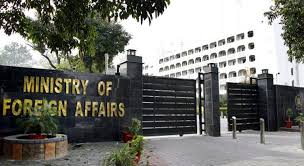The KP Government’s move to send delegations to Afghanistan has drawn a firm response from the Foreign Office, which reaffirmed that foreign affairs remain under federal control. Officials emphasized that any such initiative must align with constitutional protocols.
“Under the Constitution, foreign affairs are the responsibility of the federal government,” said Foreign Office Spokesperson Shafqat Ali Khan. His statement came as the KP Government announced plans to send representatives to Kabul for discussions on security and economic cooperation.
Sources within the federal administration revealed that a senior KP official had recently stated that the federal government would be consulted once groundwork for the delegations was completed. This indicates that the initiative requires approval from Islamabad before proceeding.
The federal authorities are expected to assess all aspects of the proposal. They may also include their own experts in the delegations and define the scope of discussions. If clearance is granted, the Pakistani mission in Kabul might be asked to facilitate the visits, according to official sources. The federal government expects the KP Government to adhere strictly to established protocols.
The decision to send delegations was confirmed by KP Chief Minister’s Adviser Barrister Mohammad Ali Saif. He outlined that two teams would be dispatched. The first would focus on diplomatic engagement, while the second would include multiple stakeholders to create a favorable atmosphere for discussions.
This development comes amid a sharp rise in terrorist incidents, which Pakistan attributes to banned militant groups operating from Afghanistan. The Afghan Taliban, however, has repeatedly denied these allegations.
Pakistan and Afghanistan share a 2,500-kilometer border with multiple crossings critical for trade and regional ties. However, security remains a pressing issue, with Islamabad urging Kabul to prevent groups like Tehreek-e-Taliban Pakistan (TTP) from launching attacks across the border.
Pakistan’s concerns were reinforced by a United Nations Security Council (UNSC) report. The document, compiled by the Analytical Support and Sanctions Monitoring Team, highlighted links between the Afghan Taliban and TTP. It detailed how Kabul has been providing logistical, financial, and operational assistance to the group.
Further evidence of this security challenge comes from data compiled by the Pakistan Institute for Conflict and Security Studies (PICSS). The statistics show that KP and Balochistan, both bordering Afghanistan, remain the worst-hit provinces. The study revealed a 42% increase in terrorist incidents last month compared to December 2024.
Due to the worsening security situation—especially the unrest in Kurram—the KP Government has been exploring direct engagement with Afghan authorities. In September 2024, KP Chief Minister Ali Amin Gandapur proposed direct talks with Kabul to address security concerns in the border regions.
The initiative was publicly supported by Pakistan Tehreek-e-Insaf (PTI) founder Imran Khan. However, it faced criticism from the federal government, which viewed it as an attempt to bypass national authority. Officials in Islamabad described the move as a direct challenge to the unity of the federation.


